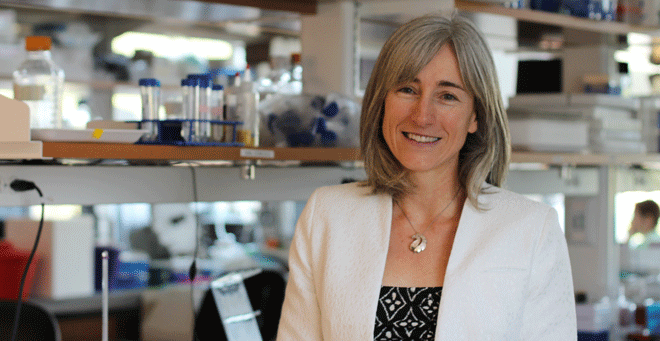 |
|
|
Laura Alonso, MD |
Researchers at UMass Medical School have discovered a new pathway that triggers regeneration of beta cells in the pancreas, a key development that may aid in the development of diabetes treatments. The research was published online in The Journal of Clinical Investigation.
Insulin, a hormone that regulates blood sugar, is made in pancreatic beta cells. When insulin demand in the body exceeds beta cell insulin production capacity, prompted by events such as beta cell loss (type 1 diabetes) or weight gain (type 2 diabetes), beta cells proliferate in an effort to meet insulin demand. Until now, it was unclear how beta cells sense the demand to make more insulin.
In an innovative study in mice, Laura Alonso, MD, the George F. and Sybil H. Fuller Foundation Term Chair in Diabetes and associate professor of medicine, and Rohit Sharma, PhD, a postdoctoral associate, discovered how the pancreas knows that more insulin-producing beta cells are needed. When there’s an increase in insulin demand, there’s a corresponding increase in insulin production in the endoplasmic reticulum (ER) of the beta cell, which causes some stress to the ER system.
“Although it was previously known that too much ER stress is bad for beta cells, causing them to die, our study found that a modest amount of stress is actually good for them, because it provides pressure to increase beta cell number to produce more insulin and keep blood sugar regulated,” Dr. Alonso said.
The research also uncovered a surprising twist. The study found ER stress pathways actually send a signal to the cell nucleus, via an ER protein called ATF6 that says “proliferate.” Importantly, the study also found that the key elements of this pathway are active in human beta cells too. According to Alonso, these results explain why beta cells are so sensitive to stress—they need to sense stress in order to determine how many beta cells are needed.
“This may also explain the conundrum of why there do not appear to be stem cells in the pancreas,” Alonso added. “Only fully mature insulin-producing beta cells are able to use this stress mechanism to sense that the body needs more insulin than the current allotment of beta cells can provide.”
The study will be published in the October issue of The Journal of Clinical Investigation.
Related link on UMassMedNow:
UMass Medical School establishes term chairs to support junior faculty